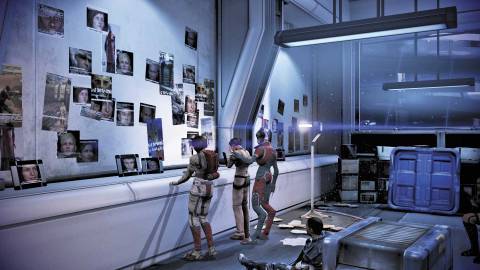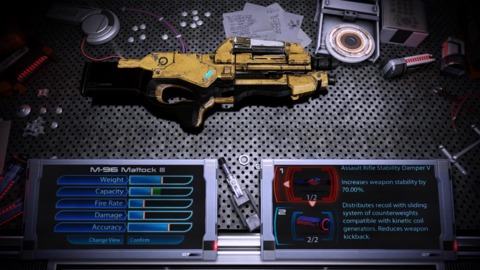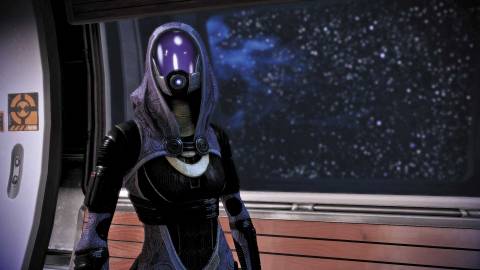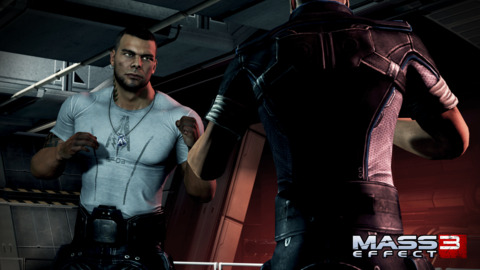
Mass Effect 3 faces expectations that are almost impossibly high, partially due to the high quality of its predecessors and the richness of its fiction. BioWare managed to create a sci-fi world worth obsessing over. Expectations are also off-the-charts because of the nature of Mass Effect's story. By adjusting itself to the choices you've made across the previous games, players have become attached to their version of the story, to their Commander Shepard. It's unreasonable to expect it to exceed every possible aspect of its predecessors, and I've tried to keep my own personal expectations in check. Mass Effect 3 certainly isn't a bad game, and ultimately I'd recommend that anyone with an importable Shepard from Mass Effect 2 should check it out. But even after making a real attempt to be pragmatic about Mass Effect 3, I've come away from it feeling a little disappointed about the way this trilogy closes out.
No one wanted to believe him/her, but it's all true. The Reapers are real, they're attacking Earth, and Commander Shepard is the only one with any real experience dealing with this threat. After a brief sequence on Earth that largely serves as a tutorial about how to shoot and use abilities, Shepard is back on the Normandy and back in command with orders to go get help from the other civilizations around the galaxy. Much like Mass Effect 2 was all about assembling a loyal crew for a final "suicide mission," Mass Effect 3 is about traveling the galaxy and solving problems in order to make entire races and planets loyal to your cause to ensure they'll be present for a final conflict with the Reapers.
The tasks you'll face, some optional and some mandatory, get funneled into your fleet strength, and the choices you'll make along the way also impact this number in ways both big and small. So if you allow a reporter to embed herself on your ship and grant her occasional interviews, you'll be able to rally (or discourage) specific factions in your fleet, which can raise or lower your number a little bit. Other choices, such as how you address the Krogans' ongoing fertility problem, make a larger impact and potentially come at a price, as one faction might not like it if you side with another. As in Mass Effect 2, you can proceed past the story's point of no return with less than a full complement of allies, but this will have storyline consequences. Filling the "you must have this many allies to proceed" bar, though, isn't especially challenging, assuming you're willing to scan some planets and embark on some optional missions along the way.

Along with building your alliances, scientists will also be constructing something that they think can stop the Reapers. But those old space racists at Cerberus have their own ideas about how best to proceed. So along with ending centuries-old conflicts via 30 minutes of third-person shooting and a few choices on a dialogue wheel, you'll also fight your way through human enemies, along with Reaper husks or others, depending on the scenario. Much of the side content in Mass Effect 3 is combat-focused, to the point where the game's multiplayer levels appear as "N7 missions" in the campaign, and most of these have you running around a relatively small area, hitting buttons and fending off waves of enemies. Sometimes a mission will simply stop and give you the objective of "survive," which feels like an artificial way to pad some of these missions out. It's not that the combat in Mass Effect 3 is bad--it's cleaned up and feels a bit tighter than ME2's did--but it's still not substantial enough to serve as the centerpiece of the game.
For me, the centerpiece of a Mass Effect game is the story and the characters. Along these lines, Mass Effect 3 can feel like a reunion, if enough of the ME2 cast is still alive in your version of the story. It's easy to see where the existing characters can either plug right into the action or be replaced with generic counterparts, if necessary. Heading out to meet up with Krogans? Hey, Grunt's there! Encountering the Quarians? You'd better believe that Tali's showing up. And yes, you'll face the Geth, and... yeah, it's not hard to guess about who you'll run into along the way. In a game where the full crew of ME2 survived, the story of Mass Effect 3 feels like one big coincidence after another because you're constantly and conveniently bumping into prominent cast members. Yet most of these old crew mates won't be returning to the Normandy this time around, because most of them have other responsibilities. Some of them will, however, appear on the ground while you're performing missions, but they'll be heading up a second squad or off performing their own tasks while you fight, relegating them to little more than radio chatter. Even with that in mind, as someone desperate to see how this story was going to conclude, it's great to see this cast of characters coming together again. And though it leaves a hint of an opening for some further adventures in this universe via a really hokey post-credits sequence, the actual endings provide a decent bit of closure for your Shepard story, even if the final speech that tries to tell you what you're choosing between is a little convoluted.
There aren't too many new faces in your crew. The most prominent is Alliance soldier James Vega, a thick-necked human with a no-nonsense attitude and an affinity for making up nicknames for the other members of your crew. Personally, I liked the idea of having a guy around who wanted to call me "Loco," so James found his way into my three-man crew more often than not. He starts out slowly, but his character develops in an interesting way over the course of the game. Considering that most of the people you encounter are already extremely well-established in the fiction, it's nice to have a couple of new characters to uncover along the way.

It's great that the game takes so many of your previous choices into account, and it can feel like magic when that works out in a memorable way. Some of the interactions feel a little light, but it's generally pretty cool. Love interests, which have been a part of the previous games, often come off a bit strange, though. Since the game's built to handle a wide variety of potential outcomes and partners, it occasionally flip-flops between heartfelt dialogue that makes sense when talking to someone that you've gotten with in the past to terse, "just friends" sort of lines. Perhaps it's a bit much to ask the developers to record each line multiple times to account for the different subtexts that can be hidden behind the script, but it sticks out just the same.
If you aren't interested in performing the optional tasks required to fill up the "Effective Military Strength" bar and get the game's best (or, at least, most prepared) ending, you can fill it up halfway and then raise your readiness rating via the game's multiplayer. By default, the rating starts at 50 percent, so for every bit of help you're getting by completing tasks, you're only getting half of its true value. Again, it's pretty trivial to get twice the amount you need and fill the bar completely before embarking on the game's final missions, so the multiplayer isn't a vital component to the campaign. But it still has some interesting ideas that almost make me wish it played a heavier role.
The multiplayer side of the game allows four players to join together and go through 10 waves of enemies. It's Mass Effect's take on the standard wave-based survival mode format, with ammo dumps spread around the map to let you reload and the ability to raise a fallen comrade if you reach them quickly enough. It also slides in some objectives along the way, forcing you to activate four consoles, or take down four marked targets, and so on. These objectives are timed and they aren't optional. If you can't complete the task before time expires, you fail completely. And failure, either from a missed objective or losing all of your teammates, sends you back to the menu. There's no second chance at a wave, you'll need to start again. In my experience, most runs at the middle difficulty were taking around 30 minutes to complete, and the bonus you get for completing the task and getting everyone out alive is sizable.

Along the way, you'll earn credits and experience points. XP is broken up by class, and each class has a few races associated with it that all level up together. So if you play a drell adept, the asari adept also levels up along the way. The racial differences come in the form of preset power assignments. So that drell adept has reave, pull, and cluster grenades. And the asari has stasis, warp, and throw. You can swap characters out easily before going into a match, so these race/class combos sort of feel like preset loadouts from a first-person shooter. You can, however, choose any two weapons, and the attachment system comes into play, allowing you to slap items onto your guns that increase accuracy, damage, shots per magazine, and so on. This same system appears in the single-player, but acquiring weapons and attachments takes a bit more work in the multiplayer.
As you level up, you'll earn points to spend on your powers, just like in the campaign. But credits can be spent on random item packs. There are three different qualities to choose from, and the more expensive packs guarantee items of a higher rarity. Some of these items are single-use bonuses that you can trigger via the D-pad during combat, like an item that instantly restores your health and shields, an ammo replenisher, or medigel that can be used to resurrect yourself in case a teammate won't make it over to you. But you'll also find better weapons, attachments, and even new character/class combinations along the way. I came out of most multiplayer matches with 15-20,000 credits, which is enough for three or four base-level packs or one of the middle-grade packs. The randomized nature of it all can be maddening if you're trying to get a specific upgrade, and some sort of user-level item trading system might have been nice. But there's a bit of a thrill that comes when you're spending these hard-earned credits and waiting to see what pops out. If you're the impatient type, you can also toss real dollars at it and buy mid-level packs for a buck or high-level packs for two. I got curious and threw about $10 at it to see what sort of things popped out in the rare packs and wasn't too thrilled with what I got. That's the luck of the draw, I suppose.
Even though it has some interesting ideas, it's hard to get excited about yet another take on wave-based survival, especially one that uses the occasionally-clumsy Mass Effect combat as its base. Once you start thinking about how most of the campaign's side content either uses these same multiplayer levels or has you performing extremely basic retrieval tasks, it's easy to start feeling slightly indignant about the whole thing.
But only slightly. At the end of the day, Mass Effect 3 is a game for people who liked Mass Effect 2 so much that they absolutely need to see how it all ends. Despite claims to the contrary from the game's publisher, I really don't think newcomers will get much out of it at all. All it would take is getting to the new character creation screen and being forced to select between Numerous, Ashley, or Kaiden from a screen that asks you who died during your previous missions for a new player to realize they're being asked questions they couldn't possibly answer in an educated way. The value in this story is from seeing characters you adore dealing with a continuing situation. Even though it doesn't come together quite as successfully as it did in the previous games, those of you with an attachment to the Mass Effect universe should still play it.